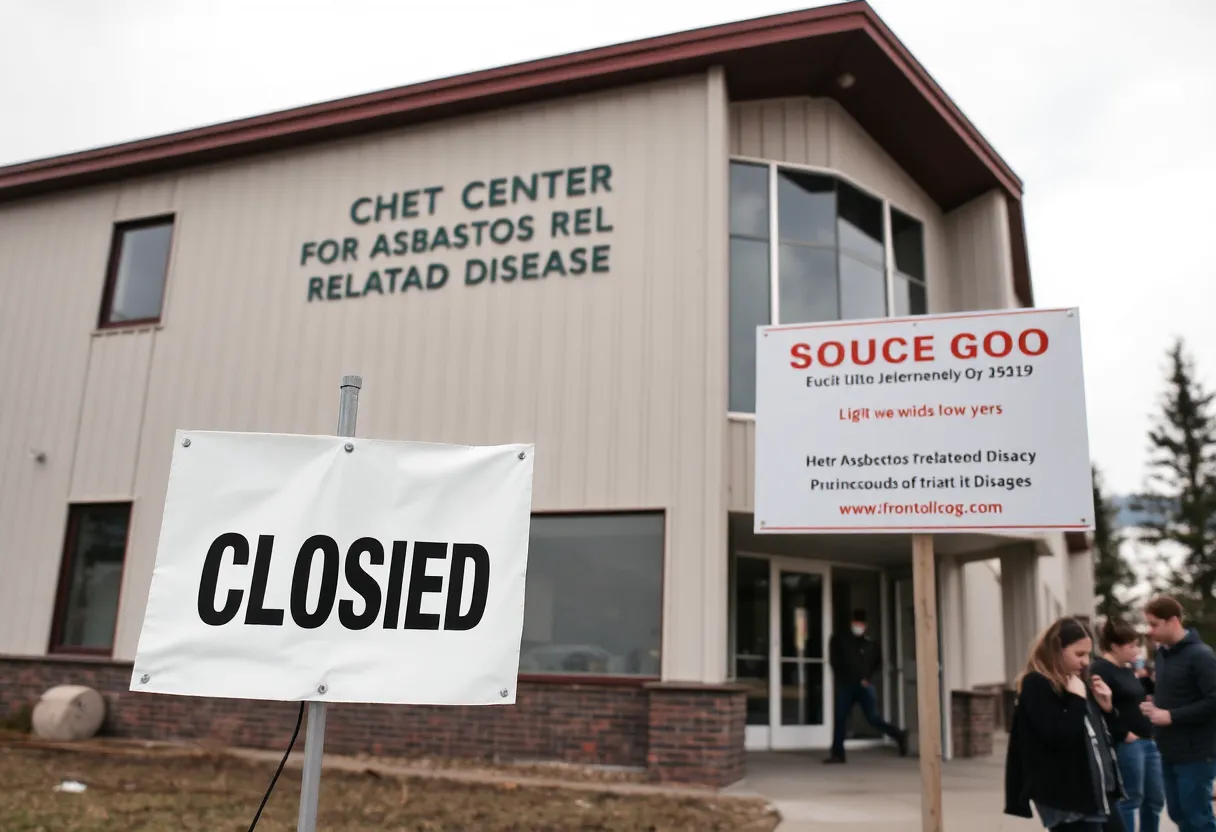News Summary
The Center for Asbestos Related Disease in Libby, Montana has closed due to legal disputes, raising concerns for asbestos survivors in the area.
Clinic That Helped Libby Mesothelioma Survivors Shuttered Amid Legal Battles
Closure of the Center for Asbestos Related Disease Raises Alarms
A critical facility for those affected by asbestos exposure has been *forced to close its doors* — the Center for Asbestos Related Disease (CARD) in Libby, Montana. The closure comes in the wake of a *staggering $3.1 million judgment* owed to BNSF Railway, a company long tied to the asbestos crisis in this small town.
Recently, *the Lincoln County Sheriff’s Office intervened*, seizing CARD’s assets, leading to an uproar in the community that has borne the brunt of widespread asbestos contamination for decades. CARD has operated since 2000, specifically addressing the needs of the local population, many of whom have been devastated by asbestos-related diseases.
Upcoming Hearing Could Determine Future
The impending fate of CARD will be scrutinized in a court hearing scheduled for June 12 in Missoula. A federal judge will supervise this pivotal session, where the clinic’s financial future, along with the health of thousands of residents, hangs in the balance. This legal battle reveals a deep rift in accountability; BNSF has been identified as *partly responsible* for the asbestos crisis in Libby, primarily through transporting contaminated vermiculite.
In a shocking turn of events, BNSF also accused CARD of *fraudulent practices*, asserting that over 300 of the 2,000 diagnoses made by the clinic were questionable. This accusation adds yet another layer to the ongoing tension between the railroad and the health facility, which has been *crucial for local patients*.
Response from the Community and Local Leaders
Community leaders have voiced their concerns over the clinic’s closure, deeming it *inexcusable* for the victims of the Libby asbestos disaster. The facility is not merely a health clinic; it has been a *beacon of hope* for many suffering from deadly diseases caused by asbestos exposure.
While the clinic has filed for bankruptcy, it had previously been permitted to operate. CARD is currently exploring avenues to *reopen*, including a potential federal grant. As of 2024, they secured a $3 million federal grant aimed at supporting operations through at least 2029. Despite these efforts, the community is apprehensive about the implications of a reduced capacity for screening and treatment.
The Impact of Asbestos on Libby Residents
Libby remains infamous due to its long history of *asbestos mining*, which dates back to the late 19th century. This mining has resulted in a *devastating public health crisis*, with more than 3,000 residents estimated to have succumbed to asbestos-related illnesses. The U.S. Environmental Protection Agency placed Libby on its Superfund list in 2002, recognizing the alarming health risks posed by asbestos contamination.
In 2024, a federal jury ruled that BNSF played a role in the deaths of two local residents due to this contamination. The legacy of damage requires continuous monitoring and care, making the function of CARD even more critical for the community’s health.
Legal Complications and Patient Concerns
Legal complexities abound as the clinic fights against the seizure and attempts to defend its practices against various allegations, including *medical malpractice* and *wrongful death*. Patients have been instructed to consult pulmonologists for monitoring their conditions and to expect imaging results to arrive in the mail.
With CARD’s decades-long commitment to serve the Libby community and certified over 3,400 patients with related diseases, any disruption in its operations carries *grave implications* for health outcomes. As patients await the June hearing, many feel uncertainty about accessing the care they desperately need.
The community’s reliance on CARD amidst these challenges underscores the need for robust health support systems to protect vulnerable populations historically scarred by corporate negligence. As legal battles unfold, the health and well-being of Libby’s residents continue to tread a precarious line, caught between accountability, funding, and essential health services.
In the face of uncertainty, the resolve of the clinic’s staff, alongside the community’s unwavering spirit, stands as a testament to their bravery in confronting the ongoing tragedy that is mesothelioma and other asbestos-related disorders.
Deeper Dive: News & Info About This Topic
HERE Resources
Philadelphia School District Faces Federal Scrutiny Over Asbestos Management
Developments in Mesothelioma Vaccine Research
Contamination Concerns at Crossford Building Site Addressed
Unseen Dangers: The Truth About U.S. Building Materials That Still Pose Risks
Groundbreaking Research Unveils Genetic Links Between Asbestos Exposure and Mesothelioma
Groundbreaking Study Unveils Genetic Clues in Malignant Pleural Mesothelioma
Asbestos Corruption Trial Nears Conclusion in Bloemfontein
Reserve Bank’s Martin Place Headquarters Set for Major Asbestos Remediation
Legal Battles in the Spotlight: The Case of Moroadi Cholota
New Stadium Plans Spark Asbestos Concerns in Berlin



















